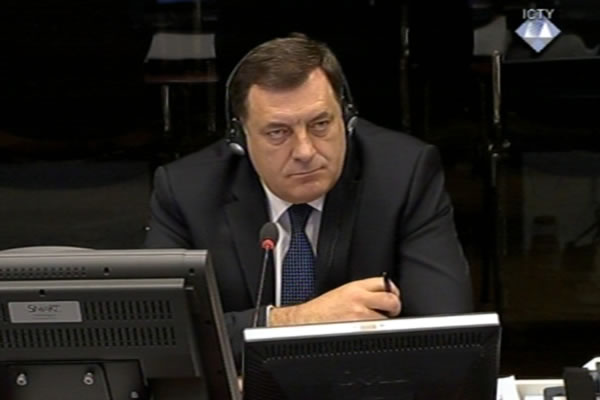Home
DODIK BLAMES IZETBEGOVIC, HIGH REPRESENTATIVE AND OTP
As he testified in Radovan Karadzic’s defense, Republika Srpska president Milorad Dodik blamed the war and all the bad things that happened in BH on Alija Izetbegovic, the international community’s High Representative and the OTP in The Hague. The SDS headed by Karadzic advocated peace and compromise
 Milorad Dodik, defence witness of Radovan Karadzic
Milorad Dodik, defence witness of Radovan Karadzic As Milorad Dodik explained today, Alija Izetbegovic, the international community’s High Representative and the Tribunal’s OTP were responsible for the war and everything bad that had happened in BH. Izetbegovic was guilty because he implemented a ‘dangerous’ policy in a bid to create a unitary BH based on the Sharia law and other principles presented in his Islamic Declaration; this laid foundations for the war. The High Representative was guilty because after the war he ‘placed himself in the service of the forces that wanted to create a unitary BH’ and to that end, he imposed ‘unlawful laws’ that armed the Serb side. The OTP in The Hague was responsible because it indicted ‘only Serbs’ and portrayed them as ‘disruptive factor’; by doing so, the OTP clearly took sides.
In the examination-in chief, Karadzic and Dodik, the former and current presidents of Republika Srpska, agreed that Izetbegovic’s act of the ‘unilateral secession’ of BH from Yugoslavia caused the war in BH. It was an attempt on Izetbegovic’s part to ‘impose the will of the Muslim minority’ and ‘a unitary state’ on the Christian majority. However, Dodik admitted that Bosnian Croats, who were part of the ‘Christian majority’ supported the secession of BH from Yugoslavia as a sign of their support to the ‘unilateral secession of Croatia’. On the contrary, ‘the Serbian Democratic Party always advocated BH’s continued existence as part of Yugoslavia and supported finding a compromise for a continued co-existence’.
Prosecutor Alan Tieger asked Dodik in the cross-examination if he agreed that during the war Serbs committed mass crimes against Croats and Muslims in 1992. Dodik replied there was a civil war in BH and that all three ethnic armies violated the provisions of international laws of war and were guilty of crimes.
The prosecutor reminded Dodik that at a Regional Assembly session on 12 January 2001 in Banja Luka he made serious accusations against the SDS. According to the media reports, Dodik said that crimes had been committed under the SDS leadership and that many SDS leaders would end up before the Tribunal for those crimes. Dodik didn’t deny that he said that. It was a time of the transition of power and political in-fighting and a ‘political speech doesn’t have to be based on facts’, Dodik explained.
Prosecutor Tieger also noted that at the trial of Radoslav Brdjanin Dodik said the SDS was a well-run party with a clear chain of command. In an interview with the prosecution in 2003, Dodik explained how the chain of command worked: municipal board presidents were elected with Karadzic’s approval. Dodik now repudiated that part of the interview claiming that he never ‘authorized and signed it’. He claimed the prosecution was trying to ‘frame’ him, although the prosecutor today told him clearly that the interview had been taped with his consent.
In answer to a previous question, Dodik said that in his party municipal board presidents couldn’t be elected without his consent. When the prosecutor reminded him that in his interview to the OTP Dodik said that Radoslav Brdjanin couldn’t have been appointed the president of the Autonomous Region of Krajina without Karadzic’s approval and ‘blessing’, Dodik replied that it was only his ‘assumption’. Dodik was reminded of some other things he said about Karadzic’s views and role in the interview with the prosecutors in 2003. ‘I said that I thought it was like that, I didn’t make any claims. Now I think it isn’t so’, Dodik replied today.
Dodik confirmed that in 2005 he said that Radovan Karadzic had taken 36 million German marks from the Republika Srpska treasury in July 1997, just before he went into hiding. At the time, Dodik labeled the act as ‘unacceptable, incomprehensible, illegal and unfair to the poor war veterans’. Today Dodik claimed that he ‘came to realize’ – more than eight years after the fact – that ‘the money had been deposited in Serbia for the purchase of construction materials to be used in the effort to rebuild Republika Srpska and Eastern Sarajevo in particular’. Despite the fact that he had held top posts in the Republika Srpska Government throughout the time, Dodik admitted that he had been misinformed about the fate of the large amount of money taken from the National Bank treasury.
Linked Reports
- Case : Karadzic
- 2013-04-08 AIRBRUSHING SARAJEVO REALITY
- 2013-04-05 ‘PSYCHOPATHS AND BULLIES’ COMMITTED CRIMES
- 2013-04-04 PERFECT HARMONY AT KARADZIC TRIAL
- 2013-04-10 RELIGION DETERMINED MENU IN KULA PRISON RESTAURANT
- 2013-04-11 PRESIDENT OF ‘COMMITTEE FOR TRUTH’ ABOUT KARADZIC TESTIFIES IN HIS DEFENSE
- 2013-04-12 BEATINGS ‘WITHOUT RHYME OR REASON’
